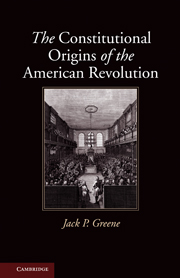3 - Empire reconsidered, 1767–1773
Published online by Cambridge University Press: 05 June 2012
Summary
A New Challenge from Parliament
If the Stamp Act crisis “first led the colonists into [systematic] Enquiries concerning the nature of their political situation,” its resolution in early 1766 by no means put an end to those inquiries. Indeed, Parliament’s renewed efforts early in 1767 to tax the colonies through the Townshend Acts quickly reopened the question. For the next six years, people on both sides of the Atlantic further explored the difficult problem, in the words of Jonathan Shipley, Bishop of St. Asaph in 1773, of “by what bond of union shall be hold together members of this great empire, dispersed and scattered as they lie over the face of the earth?” Agreement was widespread that this question was “as arduous and important … as ever the English government was engaged in.” But as they dug ever deeper into the subordinate questions of how far the authority of Parliament extended over the colonies and “how far, if at all,” the colonies were “subject to the controul of the parent state,” people of all persuasions revealed a fundamental ambivalence about the implications of their findings. On the one hand, they desperately hoped that, once it was “better understood,” the “political relation between the colonists and the mother country” would be settled to the mutual satisfaction of all parties. On the other, they were deeply afraid that the continued exploration of that relationship would produce results that would be detrimental to the very “continuance of the structure of the empire.”
During the crisis over the Townshend Acts, these fears helped to account for a considerable amount of pragmatic flexibility that was manifested, on both sides, by a pronounced concern to contain the dispute within a narrow compass. At the same time, however, the length and intensity of the dispute pushed some analysts on the colonial side to think through the nature of the connection between Britain and the colonies more thoroughly than anyone had ever done before. Although these thinkers regarded their conclusions as no more than an articulation of long-standing practice, they represented a radical challenge to the metropolitan belief in Parliament’s supremacy over the entire empire, a belief that, for most members of the metropolitan political nation, continued to be nonnegotiable.
- Type
- Chapter
- Information
- The Constitutional Origins of the American Revolution , pp. 104 - 148Publisher: Cambridge University PressPrint publication year: 2010



